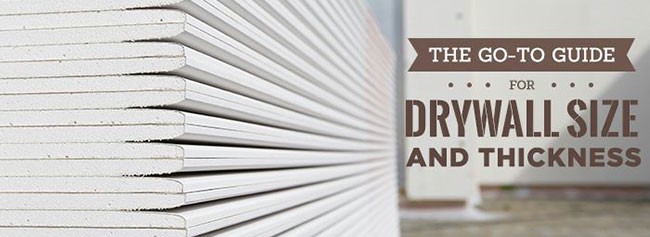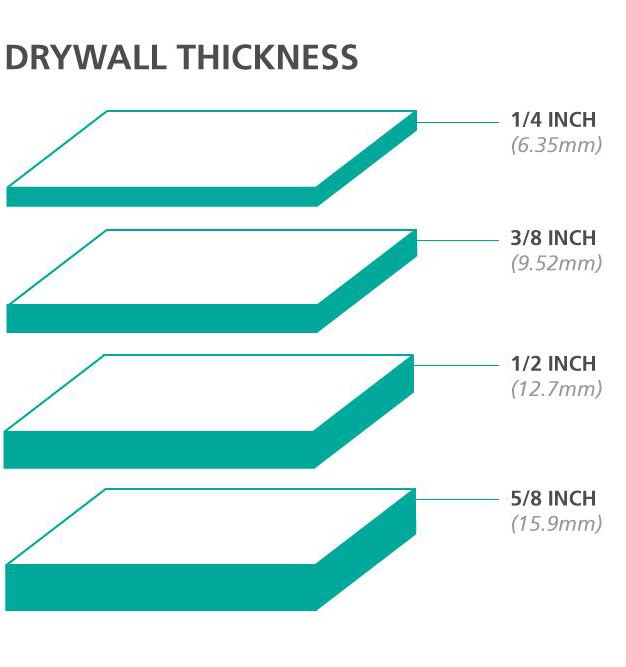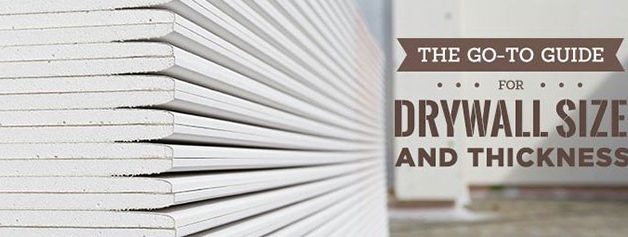
Drywall is the go-to material used for interior walls and ceilings in all types of buildings. It?s only made of gypsum covered with paper, but this amazing material can be found nearly every building in the country. Most people have never given it a second thought, but there is an art and a science to selecting the right drywall for different purposes.
Drywall comes in varying thicknesses and sizes for different projects. Fortunately, most manufacturers carry standard sizes to make the job of selecting the right drywall easier. However, it?s important to understand the variances in drywall sizes and thickness to get the best results for different applications.
Drywall Thickness
Choosing the correct thickness is one of the most important factors to consider before purchasing drywall sheets. Certain panels are light and flexible but more prone to break, while thicker panels are needed for walls and ceilings. Drywall is sold in several standard thicknesses:

- 1/4-inch (6.35mm)
- 3/8-inch (9.52mm)
- 1/2-inch (12.7mm)
- 5/8-inch (15.9mm)
Most drywall suppliers offer these four thickness options to choose from. Each thickness has its own benefits and applications it?s best suited for.
1/4 inchThe most economical option. Drywall of this thickness is ideal for curved walls or creating a new surface over plaster. These drywall panels weigh only 38 pounds and are very thin, so they must be handled with care to avoid bending or breaking.
3/8 inchThis thickness is perfect for remodeling partitions. 3/4-inch drywall can also be used to patch or fix patches of drywall where the plaster has worn off or been removed.
1/2 inchThis drywall thickness is available in a variety of panel lengths. It is often used for walls and ceilings, and are considered a standard type of drywall for most residential spaces. These drywall panels can be used with both steel and wood frames.
5/8 inchThe thickest option available, 5/8-inch drywall is ideal for commercial construction applications. 5/8-inch thick drywall is also referred to as firewall drywall. Its thickness makes it the ideal drywall for soundproofing in noisy buildings. 5/8-inch drywall can be used on walls, and will not sag when used on ceilings. This type of drywall is not typically used in residential homes, as it is heavier and more expensive than the other drywall options.
Drywall thickness is also related to other properties of drywall, such as insulation and other protection. Thicker drywall panels offer additional benefits such as fire- and moisture-resistant qualities, as well as more effective insulation. With these concerns in mind, drywall is sold with different properties:
- Insulated ? Good for rooms that don?t retain heat well. Insulated panels are typically 1/2 inch thick and have a high-strength ?polyfoam? core to prevent warping.
- Fire resistant ? Available in 5/8-inch panels, fire-retardant drywall is the most expensive option.
- Water resistant ? Ideal for kitchens, laundry rooms, basements, utility rooms, and other rooms prone to water damage.
Drywall Sizes
The second most important thing to consider before purchasing drywall is what size sheets you?ll need. Getting the correct size will minimize the number of joints created and make the installation process easier. You?ll also need to consider the logistics of handling and installing larger drywall sheets. A longer drywall panel may be difficult to get up or down stairways, around corners, through doorways, or into the exact spot you need it.
Read the rest of this article on the WB Doors blog here: http://www.wbdoors.com/blog-layout/drywall-size-and-thickness


